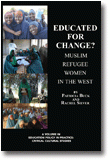
Educated for Change?
Muslim Refugee Women in the West
By:
Patricia Buck, Bates College and Matawi, Inc.
Rachel Silver, Matawi, Inc.
A volume in the series: Education Policy in Practice: Critical Cultural Studies. Editor(s): Rodney Hopson, American University. Edmund Hamann, University of Nebraska-Lincoln.
Published 2012
Educated for Change?: Muslim Women in the West inserts Muslim women’s voice and action into the bifurcated, and otherwise male dominated, relations between the West and the Islamic East. A multilayered, multisite, educational ethnography, Buck and Silver’s study takes a novel approach to its feminist charge. Drawing upon thick description of refugee women’s school experiences in two seemingly distinct locations, Educated for Change? engages the dual nature of schooling as at once a disciplinary apparatus of local, national, and international governance, and paradoxically, a space and process through which school community members wield the power to observe, deliberate, and act as agents in the creative and willful endeavor of living. In doing so, the text locates formal schooling as a key location at which one can witness the politics of cultural change that emerge when Western and Islamic communities converge.
Following an initial introduction to the ethno-historical formation and dissolution of the Somali postcolonial state resulting in a prolonged exodus of Somali citizens, the text is divided into two parts. Part One features an examination of young women’s approaches to schooling in the Dadaab refugee camps of northeastern Kenya; Part Two looks at schooling among Somali women resettled in a northern region of the United States. Each part includes a description of the unique, if interconnected, local factors and policies that give rise to particular forms and ends of schooling as designed for refugee women. Several chapters depict women’s strategic use of schooling to respond to structural forces, build intercultural social networks, and negotiate new ways of being Somali women.
Educated for Change? concludes with an analysis of the implications of Somali refugee women’s schooling experiences for working definitions of global social justice that undergird feminist political scholarship and gender-sensitive, humanitarian aid policy and practice.
CONTENTS
Foreword, Bradley A. U. Levinson and Margaret Sutton. Series Editors’ Introduction: Recentering the Critical in Sociocultural Ethnographic Studies, Rodney Hopson & Edmund T. Hamann. 1. In the Confluence of Islamic East and West. 2. Somalia: Tracing a Contested Traditionalism. 3. “If Any Culture is in Need of Change, It’s Somali Culture”:Enlightenment and Girls’ and Women’s Empowerment in the Dadaab Refugee. 4. Negotiating the Dadaab Landscape: Refugees Respond to Polarity in Dadaab. 5. Somali Refugee Girls and Women in School. 6. “The Culture Will Change as the World Changes”: Using School to Navigate the Global Era. 7. Dialogues of Change. 8. Bridge: From Dadaab to Milltown. 9. The United States and Milltown: Traditionalism, Liberalism, & Nativism. 10. Somali Women in U.S. Schools. 11. Crafting Identity Through Community Building. 12. “You Better Say Your Prayers Before Prayers Are Said for You”: Negotiating and Regulating Gender Change. 13. Educated for Change?: Some Concluding Thoughts. Afterword: Final Reflections on Our Project. References. About the Authors.
REVIEWS
"Buck and Silver provide a strong counternarrative to Orientalist depictions of Muslim women as passive and oppressed by radical Islam, showing how women actively, discur- sively, and transnationally engage with notions of modernity and tradition in their edu- cational journeys. This ethnography charters new territories in refugee studies by locating emergent cultural, historical, and structuring forces in fractured schooling contexts and relying on women’s narratives to illuminate the gendered production of Islamic East–West relations.
Such an excavation contributes vitally to theories of social and transnational citizenship and the field of anthropology of education, and ultimately enriches scholarly conversa- tions around gendered experiences of precarity in a globalized era." Julia McWilliams University of Pennsylvania in Anthropology & Education Quarterly
-
Paperback978-1-61735-620-9
Web price: $45.04 (Reg. 52.99)
-
Hardcover978-1-61735-621-6
Web price: $80.74 (Reg. 94.99)
- eBook978-1-61735-622-3

- EDU038000 - EDUCATION: Student Life & Student Affairs
- SOC008000 - SOCIAL SCIENCE: ETHNIC STUDIES: General
- SOC028000 - SOCIAL SCIENCE: Women's Studies
-
 Learning to Hide
The English Learning Classroom as Sanctuary and Trap
Learning to Hide
The English Learning Classroom as Sanctuary and Trap
-
 Navigating the Volatility of Higher Education
Anthropological and Policy Perspectives
Navigating the Volatility of Higher Education
Anthropological and Policy Perspectives
-
 Paths to the Future of Higher Education
Paths to the Future of Higher Education
-
 Placing Practitioner Knowledge at the Center of Teacher Education
Rethinking the Policies and Practices of the Education Doctorate
Placing Practitioner Knowledge at the Center of Teacher Education
Rethinking the Policies and Practices of the Education Doctorate
-
 Researching Race in Education
Policy, Practice and Qualitative Research
Researching Race in Education
Policy, Practice and Qualitative Research
-
 Revisiting Education in the New Latino Diaspora
Revisiting Education in the New Latino Diaspora
-
 The Construction, Negotiation, and Representation of Immigrant Student Identities in South African schools
The Construction, Negotiation, and Representation of Immigrant Student Identities in South African schools

